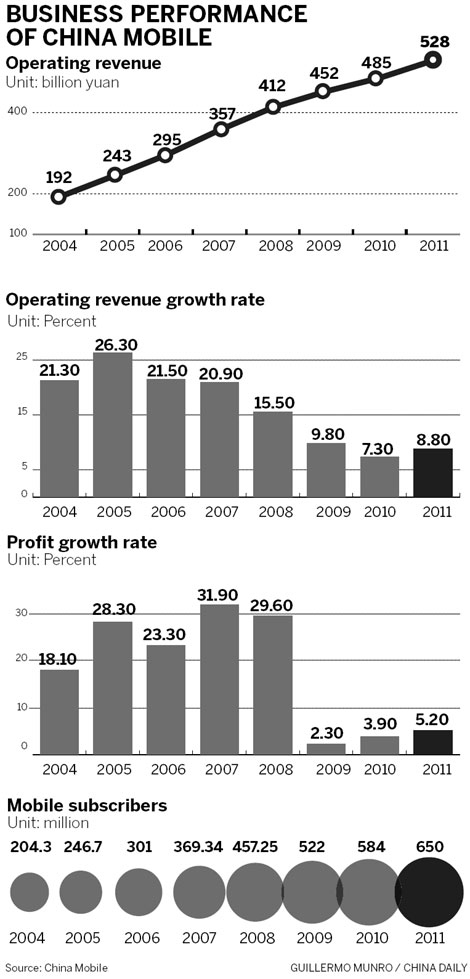 |
|
|
|
|||||||||||
Innovative
"I cannot imagine a more beautiful picture than a farmer using a mobile phone near his farm house, with the blue sky and green fields," Wang said.
China Mobile is very much a State-owned company. It shoulders the responsibilities of constructing telecommunication facilities, providing telecom services and hands over profits to the government.
|
 |
However, unlike most State-owned enterprises, such as banks and oil companies, China Mobile demonstrates a noticeable characteristic - a willingness to embrace innovation. Analysts said this is because the telecom industry by its very nature has a close relationship with innovation. Moreover, Wang, the leader of China Mobile, was good at making long-term strategic moves.
He said the telecom industry changes fast and mobile Internet is perhaps the biggest ongoing change.
Mobile Internet is a convergence of the telecom industry and the Internet industry. Therefore, Internet companies and handset manufacturers compete for market share, which squeezes the profits of traditional telecom businesses, such as voice and text messaging, and pressured telecom operators to transform.
On many occasions Wang has said telecom operators are going to compete with outsiders, such as Google Inc and Apple Inc. "If we take no action, operators may gradually become a silent pipe," he warned.
As more people use mobile phones to surf the Internet, Wang estimated that in the future the volume of data will be more than that of voice alone, and telecom operators should prepare for that.
"The data business will become more and more important," he said.
As early as 2000, China Mobile introduced the "Monternet" platform, which enables customers to get access to various value-added services, such as short message services and Color Ring, a service that allows subscribers to customize ring tones.
After Wang took office, China Mobile took even bigger strides toward new business fields.
The company started to build up nine business bases in different Chinese cities from 2006, including a wireless music base in Chengdu and a mobile video base in Shanghai. The function of the nine bases is to produce content and find effective business models in the mobile Internet era.
Like some innovative companies in the Internet industry, China Mobile also developed its own mobile operating system, called Ophone, in 2009, and an instant messaging tool, Fetion, which has close to 100 million active users.
In China Mobile's mobile Internet strategy, its application store, the Mobile Market, is expected to play a core role. The Mobile Market is the world's first mobile phone application store set up by a telecom operator. After it was launched in August 2009, the number of applications grew to more than 95,000 by October 2011.
Every new business attempt reflects China Mobile's response to the crossroads of industry convergence. "However, we haven't seen significant progress in China Mobile's data businesses so far," said Huang Meng, a telecom analyst with Beijing-based research firm Analysys International.

|

|

|

|

|

|